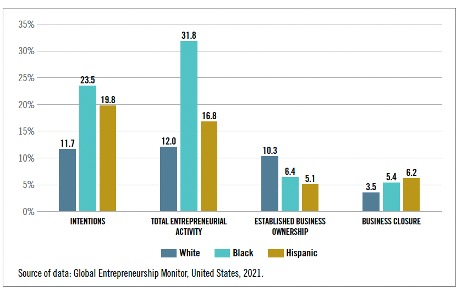"GEM research has certainly influenced policymakers’ discussions about entrepreneurship.”
These are the words Mark Hart, GEM UK Team Lead and Deputy Director of Enterprise Research Centre at Aston Business School, shared during a recent GEM webinar.
“Throughout the years, GEM data has been consistently used by government officials in Scotland, Wales, Northern Ireland and the United Kingdom,” said Hart. “Individuals from a range of departments look at our reports and seek to understand them. We have discussions all the time with officials on how GEM data can impact policy. There is particular interest around gender, ethnicity and immigration.”
An example of such a conversation was the Savvitas Business & Parliament Forum that took place on 6 December at the Chess Room, House of Commons. Over lunch, Hart and GEM Executive Director Aileen Ionescu-Somers shared key findings from the GEM 2021/2022 Women's Entrepreneurship Report and their implications for UK enterprise policy (participants are featured in the image above). Outcomes from the discussion with the officials will be taken forward as policy suggestions across government and to all political parties and relevant bodies.
Monica Rio Nevado de Zelaya, Dean of the School of Economic Sciences at the Universidad Francisco Marroquín and head of the GEM Guatemala Team, noted on the webinar that her team’s research has significant influence among the media and with policymakers in the country.
“When we launch our National Report, we are very visible in the press, and throughout the year we present results to different groups,” she said. “GEM is an indicator referenced for good results by the Economics Ministry Department in Guatemala. Everyone here uses GEM as the reference point for entrepreneurial activity.”
Most poignantly, GEM research in Guatemala helped influence a new law on entrepreneurship. The GEM Guatemala Team shared feedback about changes to make to the law due to the evidence from GEM data. Some of these recommendations were adopted.
“One of the main purposes of our university is to increase freedom of action for entrepreneurs,” explained Nevado de Zelaya. “That is why GEM is so important. We want to read the answers from our entrepreneurs to know what is holding them back and to make this visible. This increases the possibility of entrepreneurs to act more freely and to move forward in a better way.”
 In the USA, White House officials have previously drawn upon GEM results. The GEM USA research team has provided testimony to the United States House of Representatives Committee on Small Business. There is great potential for policymakers concerned about racial equity to leverage the findings from the latest GEM USA Report that features breakdowns across white, black and hispanic entrepreneurs. (For example, see graphic above).
In the USA, White House officials have previously drawn upon GEM results. The GEM USA research team has provided testimony to the United States House of Representatives Committee on Small Business. There is great potential for policymakers concerned about racial equity to leverage the findings from the latest GEM USA Report that features breakdowns across white, black and hispanic entrepreneurs. (For example, see graphic above).
“We provide breakdowns in various ways,” said Jeff Shay, Professor of Entrepreneurship at Babson College and head of the GEM USA Team. “If I am a policymaker and I want to make the case for funding my diverse city or state, I would be drawing on GEM’s data.”
Concluded Ionescu-Somers: “The above are just a few examples that highlight how we provide policymakers everything they need to know about entrepreneurship in a country, region or city. Our GEM data tells a remarkable story about entrepreneurship over some 23 years. However, aside from tracking and monitoring the data, it is equally important for GEM to provide an up to date year-on-year narrative to policymakers so that in turn, they can make decisions that pave the way for more successful, high quality entrepreneurship in their countries.”
Watch the recorded webinar to learn more about entrepreneurship in the UK, Guatemala and the USA. To explore collaboration possibilities with GEM, contact info@gemconsortium.org.

